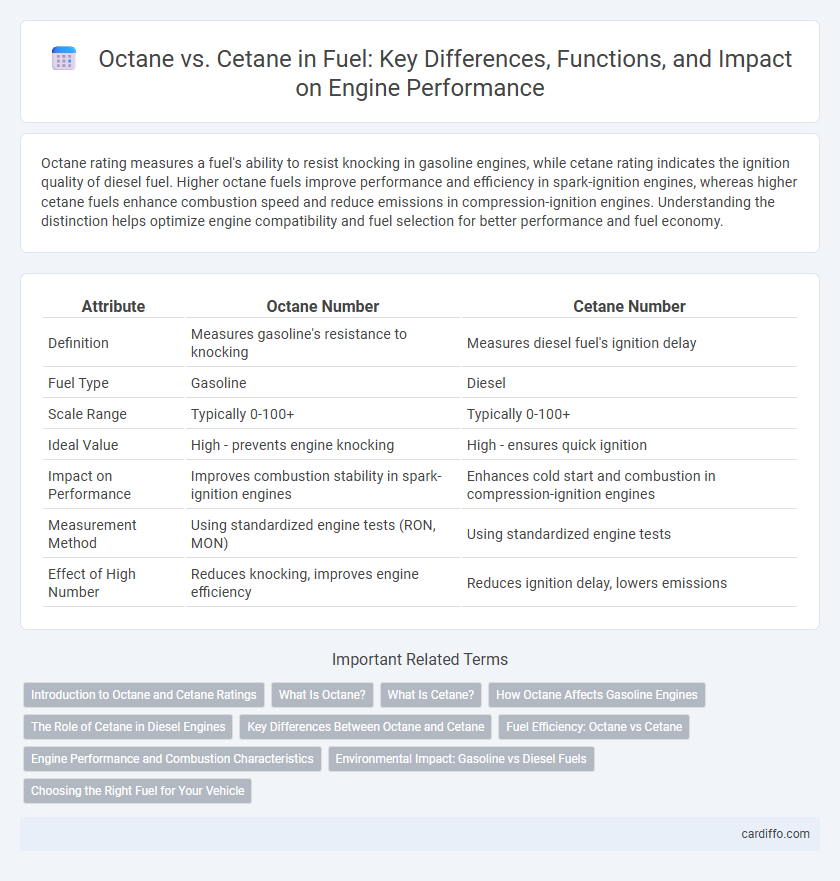Octane rating measures a fuel's ability to resist knocking in gasoline engines, while cetane rating indicates the ignition quality of diesel fuel. Higher octane fuels improve performance and efficiency in spark-ignition engines, whereas higher cetane fuels enhance combustion speed and reduce emissions in compression-ignition engines. Understanding the distinction helps optimize engine compatibility and fuel selection for better performance and fuel economy.
Table of Comparison
| Attribute | Octane Number | Cetane Number |
|---|---|---|
| Definition | Measures gasoline's resistance to knocking | Measures diesel fuel's ignition delay |
| Fuel Type | Gasoline | Diesel |
| Scale Range | Typically 0-100+ | Typically 0-100+ |
| Ideal Value | High - prevents engine knocking | High - ensures quick ignition |
| Impact on Performance | Improves combustion stability in spark-ignition engines | Enhances cold start and combustion in compression-ignition engines |
| Measurement Method | Using standardized engine tests (RON, MON) | Using standardized engine tests |
| Effect of High Number | Reduces knocking, improves engine efficiency | Reduces ignition delay, lowers emissions |
Introduction to Octane and Cetane Ratings
Octane and cetane ratings measure fuel performance in internal combustion engines, crucial for efficient operation. Octane rating indicates gasoline's ability to resist knocking during combustion, with higher values reflecting greater resistance suitable for high-performance spark-ignition engines. Cetane rating measures diesel fuel's ignition delay period, where higher cetane numbers signify quicker ignition and smoother engine operation in compression-ignition engines.
What Is Octane?
Octane is a key component in gasoline that measures the fuel's ability to resist engine knocking during combustion. Higher octane ratings indicate greater resistance to premature ignition, which improves engine efficiency and performance in high-compression engines. Understanding octane is essential for selecting the right fuel to optimize power output and prevent engine damage.
What Is Cetane?
Cetane is a hydrocarbon compound found in diesel fuel that measures the fuel's ignition quality and combustion speed in diesel engines. A higher cetane number indicates shorter ignition delay, leading to smoother engine performance and reduced emissions. This rating is crucial for diesel fuel specification, affecting engine start-up, noise, and efficiency.
How Octane Affects Gasoline Engines
Octane rating measures a gasoline fuel's ability to resist knocking or pinging during combustion, which directly impacts engine performance and longevity. Higher octane fuels prevent premature ignition in high-compression engines, enabling smoother operation and increased efficiency. Using the appropriate octane level reduces engine knocking, improves fuel economy, and protects critical engine components from damage.
The Role of Cetane in Diesel Engines
Cetane plays a crucial role in diesel engines by determining the ignition quality of diesel fuel, where a higher cetane number indicates shorter ignition delay and more efficient combustion. It directly affects engine performance, emissions, and cold-start behavior, with optimal cetane levels leading to smoother operation and lower emissions. Unlike octane, which measures resistance to knocking in gasoline engines, cetane focuses on combustion readiness in compression ignition engines.
Key Differences Between Octane and Cetane
Octane and cetane represent two distinct fuel quality metrics critical for engine performance, where octane rating measures a gasoline's resistance to knocking in spark-ignition engines, ensuring smooth combustion and preventing premature detonation. Cetane number, on the other hand, gauges diesel fuel's ignition quality by indicating the delay between fuel injection and combustion in compression-ignition engines, directly affecting cold start and engine noise. While octane emphasizes anti-knock properties, cetane focuses on combustion initiation speed, making each essential for optimal operation in their respective engine types.
Fuel Efficiency: Octane vs Cetane
Octane rating measures a gasoline fuel's resistance to knocking during combustion in spark-ignition engines, directly influencing fuel efficiency by enabling higher compression ratios and optimizing power output. Cetane number indicates a diesel fuel's ignition quality, affecting combustion speed and engine performance in compression-ignition engines, where higher cetane improves smoothness and reduces fuel consumption. Optimal fuel efficiency depends on matching the appropriate octane or cetane rating to the engine type, ensuring complete combustion and minimizing energy loss.
Engine Performance and Combustion Characteristics
Octane rating measures a fuel's ability to resist knocking in gasoline engines, enhancing performance by allowing higher compression ratios and preventing premature combustion. Cetane number indicates the ignition quality of diesel fuel, with higher cetane leading to quicker combustion and smoother engine operation in compression-ignition engines. Optimizing octane improves spark-ignition efficiency, while high cetane fuels boost diesel engine power and reduce emissions through efficient combustion.
Environmental Impact: Gasoline vs Diesel Fuels
Gasoline fuels, characterized by higher octane ratings, generally produce lower particulate matter and nitrogen oxides (NOx) compared to diesel, reducing urban air pollution and respiratory health risks. Diesel fuels, with higher cetane numbers, emit greater quantities of NOx and particulate matter but often achieve better fuel efficiency, leading to lower CO2 emissions per mile. Advances in fuel formulation and emission control technologies are critical to mitigating the environmental impacts of both octane-based gasoline and cetane-based diesel fuels.
Choosing the Right Fuel for Your Vehicle
Octane rating measures a fuel's ability to resist engine knocking in gasoline engines, while cetane rating indicates the combustion speed in diesel engines. Choosing the right fuel depends on your vehicle's engine type: gasoline engines require higher octane fuel to optimize performance and prevent knocking, whereas diesel engines need a higher cetane number for efficient ignition and smoother operation. Using the appropriate fuel improves engine efficiency, reduces emissions, and extends engine life.
Octane vs Cetane Infographic

 cardiffo.com
cardiffo.com